Guru Session #11: GLSL Shaders (Wed Apr 29th, 6pm CEST/5pm GMT/12pm EDT/9am PDT)
-
Well, one of the problems is that Isadora is going to scale this image up to the stage size, and then it's going to get blurry because of the scaling.
If you need the image to stay really low res, set the stage size to something low in the Stage Setup editor, and then use the "Capture Stage to Picture" actor to grab a picture at that resolution.You can then scale it up in an image editing program. Here's a patch with the stage set to a custom size of 128x72 as shown below.

Here's an example snap of the stage using my webcam.

Same image scaled up in Photoshop using Nearest Neighbor resampling to preserve the hard edges:
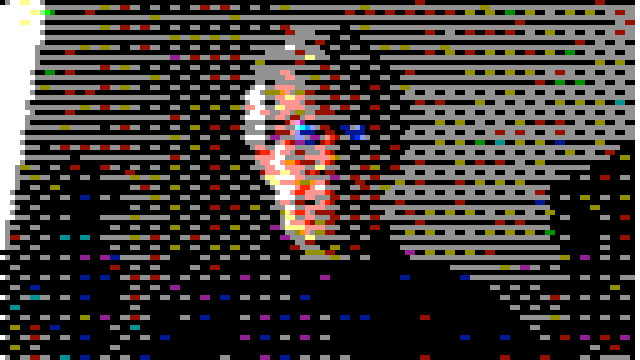
And a black and white version...

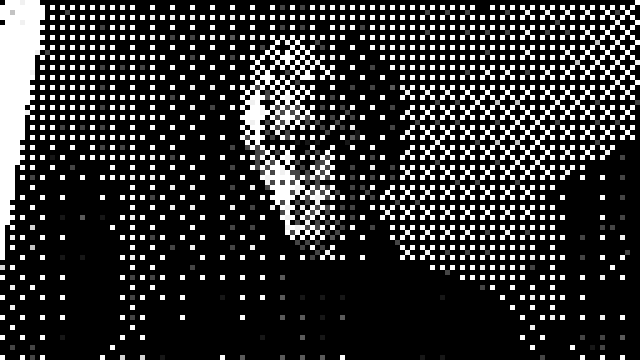
Maybe that helps?
Here's the patch: glsl dithering small stage.izz
Best Wishes,
Mark -
@mark cheers again for looking at this - it seems like a good work around at least for creating still images outseide of real-time. here is a 128 x 72 stage capture scaled up in photoshop x 300 % , and a 32 x 18 scaled up 1000%

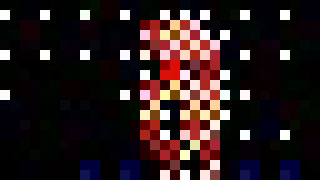

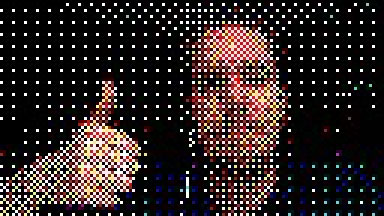
-
Thanks for this session!
GLSL seems to be a great way to manipulate images and adding some customs tools in Isadora.
I've been playing a bit with some Shadertoy shaders, and I found this answer from @mark about multi-pass shaders on the forum very useful: https://community.troikatronix... That works well. Maybe those informations could be added to the GLSL Shader Actor Tutorial ?
I would add that sometimes, in a multi-pass shader, when a "channel" needs itself (by example if iChannel0 calls iChannel0), we can add an empty GLSL node to make a loop. Here is a little example based on this reaction-diffusion shader: https://www.shadertoy.com/view... Reaction-diffusion_002.izz (sorry I'm still on 2.6).
Otherwise, there are some amazing shaders that use cubemaps on Shadertoy. I know there is a lot of work in many areas on Isadora, and I don't know how much it's complicated to make it working, but it could be a very cool feature for a next release!
Or maybe someone knows a way to avoid cubemaps (I was wondering if it's possible to use 2d textures as a cubemap...) ? -
Hi Mark....fantastic resource the guru sessions....have watched all but one - you're a fantastic tutor :-) I'm having an issue with getting the isf shaders to batch convert using the windows bat file you included. I've included the command window response for your perusal. I'm pretty sure I have the files and the bat command in the same download file....but maybe its me.
Regards
Gavin
-
@light-fx-uk said:
I've included the command window response for your perusal.
Where? I don' see it.
Best Wishes,
Mark -
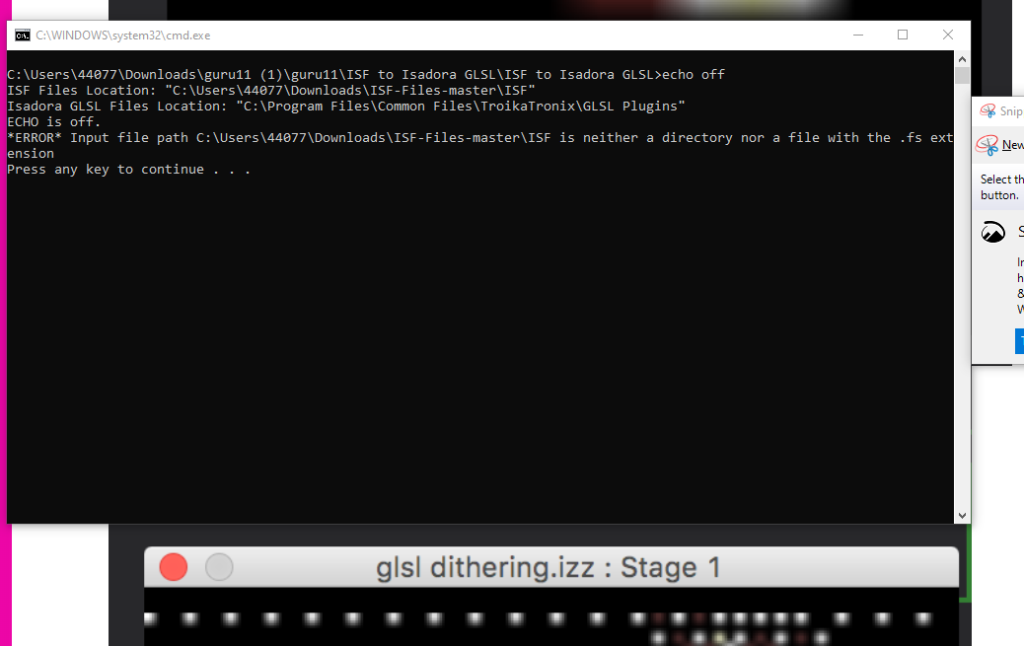
@mark sorry its here.....ony recently entered the forums so finding my feet....
-
Did you download the ISF files to your downloads folder?
1) Go to the ISF Files github
2) Click the "Clone or Download" button and choose "Download ZIP"
3) After the download completes, verify you now have a file called ISF-Files-master.zip in your download folders.
4) Right-click the .zip file and extract the contents of the .zip so that you see a folder called ISF-Files-master in your downloads folder. (Here are instructions on how to extract a zip file to a folder.)The script if the ISF-Files-master folder is in your downloads folder.
Best Wishes,
Mark -
@mark Hi Mark, yes ISF-Files-master is in my downloads folder, I ran the script but unfortunately no success.....it's probably my fault but a bit stumped on this one. See further screen grab, following another test. I downloaded everything again just to make sure.......
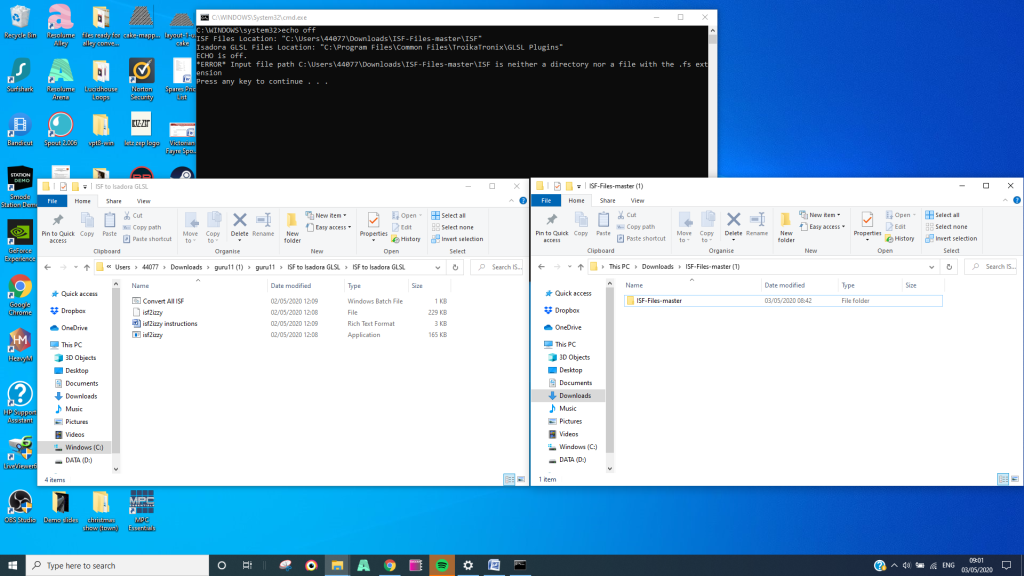
-
From what I see above, the path in your downloads folder is something like
C:\Users\YOUR_USER_FOLDER_NAME\Downloads\ISF-Files-Master (1)\ISF Files master
that won't work. (The underlined and bold part is wrong.) It must be exactly:
C:\Users\YOUR_USER_FOLDER_NAME\Downloads\ISF-Files-Master
Best Wishes,
Mark -
@mark thankyou will delete that folder and try again.....EDIT....it worked a dream.....massive thumbs up!
-
@light-fx-uk said:
massive thumbs up!
Thank you for letting me know. I will make the instructions clearer.
Best Wishes,
Mark -
@juriaan,
sorry for the super late reply;
here's my code for one of the tries
uniform float noise_level;
// ISADORA_FLOAT_PARAM (noise_level, noil, 0.0, 1.0, 0.5, "dit is de text die helpt");
uniform float dark_factor;
// ISADORA_FLOAT_PARAM (dark_factor, dkfa, 0.0, 1.0, 0.5, "dit is wat het doet"); // #define NOISE_LEVEL 0.25
// #define DARKEN_FACTOR 0.125 #define DENOMINATOR vec2(213, 5.53)
#define NEG_X vec2(-1.0, 1.0)
#define NEG_Y vec2(1.0, -1.0) #define GLITCH_OFFSET_1 vec2(32.05, 236.0)
#define GLITCH_OFFSET_2 vec2(-62.05, -36.0) float rand(vec2 co)
{
return fract(sin(dot(co.xy, vec2(12.9898, 78.233))) * 43758.5453);
} void mainImage(out vec4 fragColor, in vec2 fragCoord)
{
vec2 uv = fragCoord.xy / iResolution.xy;
// Scanline desync
if (mod(iTime, 2.0) > 1.9)
uv.x += cos(iTime * 10.0 + uv.y * 1000.0) * 0.01;
// Pixelate glitch 1
if (mod(iTime, 4.0) > 3.0)
uv = floor(uv * 32.0) / 32.0; // Pixelate glitch 2
if (mod(iTime, 5.0) > 3.75)
uv += 1.0 / 64.0 * (2.0 * vec2(
rand(floor(uv * 32.0) + GLITCH_OFFSET_1),
rand(floor(uv.y * 32.0) + GLITCH_OFFSET_2)) - 1.0); fragColor = texture(iChannel0, uv);
fragColor.rgb
+= noise_level
* vec3(rand(iTime + fragCoord / DENOMINATOR * NEG_X),
rand(iTime - fragCoord / DENOMINATOR * NEG_Y),
rand(iTime + fragCoord / DENOMINATOR))
- dark_factor;
} -
Remove the space between ISADORA_FLOAT_PARAM and (
So the second one ;) The first one is your example
// ISADORA_FLOAT_PARAM (noise_level, noil, 0.0, 1.0, 0.5, "This is the text that helps");
// ISADORA_FLOAT_PARAM(noise_level, noil, 0.0, 1.0, 0.5, "This is the text that helps");